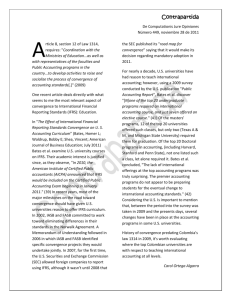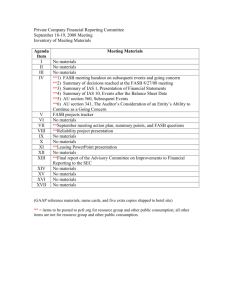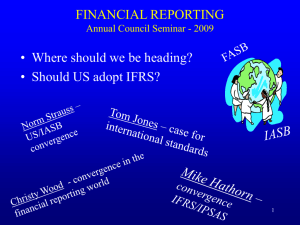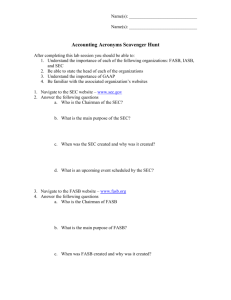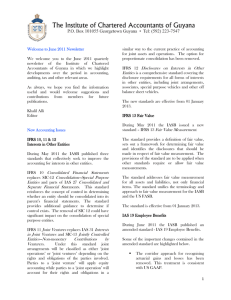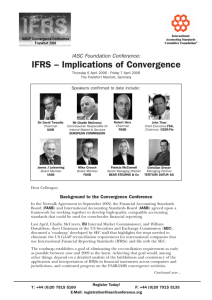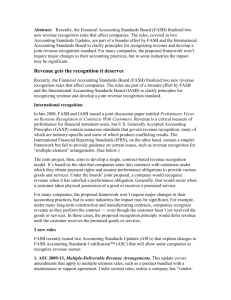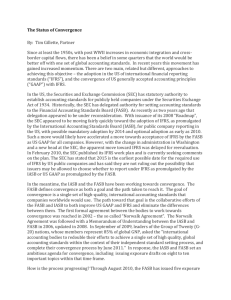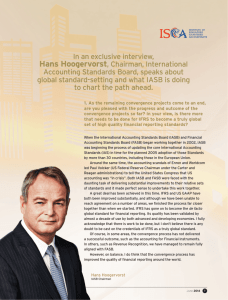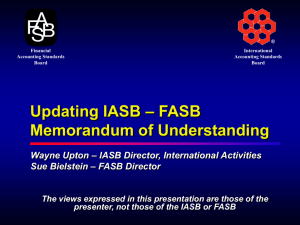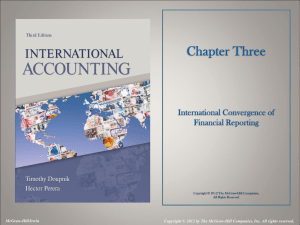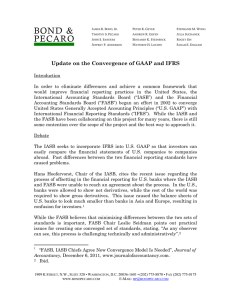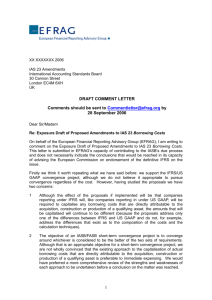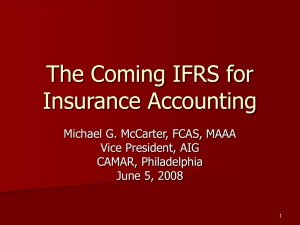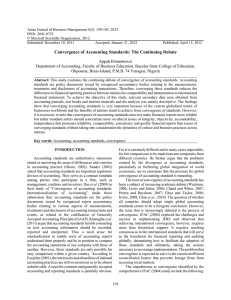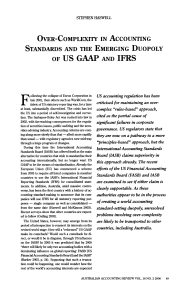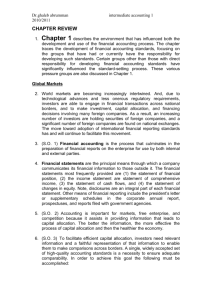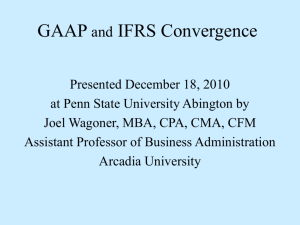CL71
advertisement
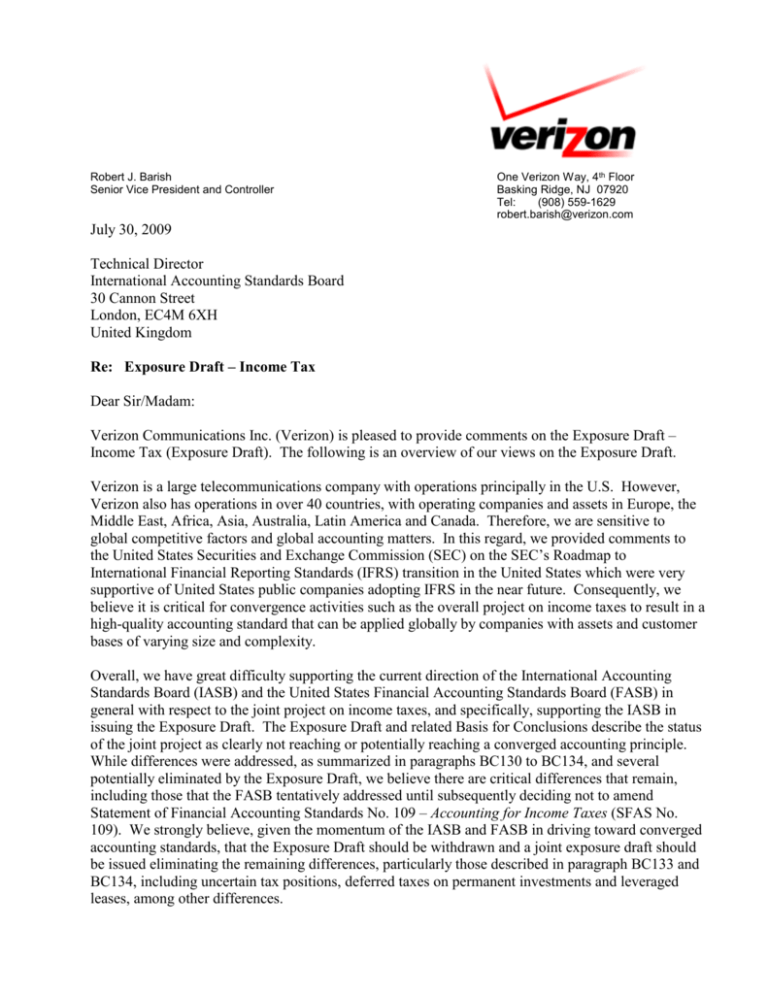
Robert J. Barish Senior Vice President and Controller One Verizon Way, 4th Floor Basking Ridge, NJ 07920 Tel: (908) 559-1629 robert.barish@verizon.com July 30, 2009 Technical Director International Accounting Standards Board 30 Cannon Street London, EC4M 6XH United Kingdom Re: Exposure Draft – Income Tax Dear Sir/Madam: Verizon Communications Inc. (Verizon) is pleased to provide comments on the Exposure Draft – Income Tax (Exposure Draft). The following is an overview of our views on the Exposure Draft. Verizon is a large telecommunications company with operations principally in the U.S. However, Verizon also has operations in over 40 countries, with operating companies and assets in Europe, the Middle East, Africa, Asia, Australia, Latin America and Canada. Therefore, we are sensitive to global competitive factors and global accounting matters. In this regard, we provided comments to the United States Securities and Exchange Commission (SEC) on the SEC’s Roadmap to International Financial Reporting Standards (IFRS) transition in the United States which were very supportive of United States public companies adopting IFRS in the near future. Consequently, we believe it is critical for convergence activities such as the overall project on income taxes to result in a high-quality accounting standard that can be applied globally by companies with assets and customer bases of varying size and complexity. Overall, we have great difficulty supporting the current direction of the International Accounting Standards Board (IASB) and the United States Financial Accounting Standards Board (FASB) in general with respect to the joint project on income taxes, and specifically, supporting the IASB in issuing the Exposure Draft. The Exposure Draft and related Basis for Conclusions describe the status of the joint project as clearly not reaching or potentially reaching a converged accounting principle. While differences were addressed, as summarized in paragraphs BC130 to BC134, and several potentially eliminated by the Exposure Draft, we believe there are critical differences that remain, including those that the FASB tentatively addressed until subsequently deciding not to amend Statement of Financial Accounting Standards No. 109 – Accounting for Income Taxes (SFAS No. 109). We strongly believe, given the momentum of the IASB and FASB in driving toward converged accounting standards, that the Exposure Draft should be withdrawn and a joint exposure draft should be issued eliminating the remaining differences, particularly those described in paragraph BC133 and BC134, including uncertain tax positions, deferred taxes on permanent investments and leveraged leases, among other differences. Technical Director July 30, 2009 Page 2 While the Exposure Draft represents positive movement towards a more consistent framework for accounting for income taxes, we believe the continuing lack of convergence will represent an example for preparers and users of financial information, as well as the SEC, to highlight the difficulties in developing high-quality, global accounting standards, thereby delaying or otherwise detracting from the SEC’s proposed roadmap to IFRS transition in the United States. We also believe that the proposed changes to International Accounting Standard 12 – Income Taxes (IAS 12) are significant enough to warrant further convergence effort in order to achieve full convergence. In other words, the proposed changes to IAS 12 described in the Exposure Draft that would eliminate many differences between current IAS 12 and SFAS No. 109 (including related interpretations) such that adopting the proposed rules by an IFRS preparer would represent a substantial change to their current income tax accounting without the benefit of achieving convergence. Consequently, further changes, which could be significant, would likely be necessary in order to achieve full convergence on the part of both IAS 12 and SFAS No. 109 (and related interpretations). As a global enterprise interested in accounting rules developed by both the IASB and the FASB, we are concerned that joint projects, such as the joint project on income taxes, will lose momentum as differences may be considered too great to overcome. It became clear to preparers and users that significant convergence efforts by the IASB and FASB would be required to result in a single, highquality set of accounting standards and conceptual differences would need to be eliminated, as outlined by the SEC in its proposed roadmap to IFRS transition in the United States. We strongly believe that, in order for United States preparers and users of financial information to understand and accept a common set of global accounting standards and effectively transition to IFRS, the IASB and FASB will need to work harder in searching for common ground on conceptual differences of opinion in order to have any hope of achieving convergence. And we do not believe this means adopting all or the majority of either SFAS No. 109 or IAS 12, but rather a reasonable, operational approach from both standards. For example, accounting for uncertain tax positions should be similar for United States preparers and international preparers that report using IFRS. However, there remains a conceptual difference principally in applying a more likely than not standard compared to a probability-weighted average. Both are reasonable approaches that have merit. So in similar circumstances that such an estimated measurement is required, we believe the IASB and FASB should either together choose a single approach and issue a proposed standard on that basis, or both options should be permitted with clear disclosures required. Furthermore, we believe the approach of allowing two options that are both acceptable is consistent with principles-based accounting standards. We would be pleased to discuss our views and specific comments related to this Exposure Draft at your convenience. You can contact me at (908) 559-1629 or Mark Kearns at (908) 559-2529 or mark.f.kearns@verizon.com regarding this matter. Very truly yours, Robert J. Barish Senior Vice President and Controller – Verizon Communications Inc. cc: Ernst & Young LLP
